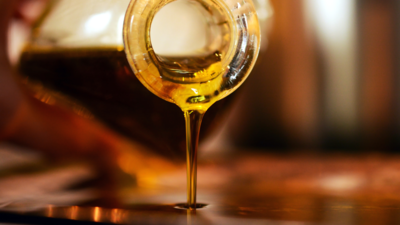What was previously considered a mere garnishing ingredient in foods is now becoming popular. Sesame oil is finally getting its well-deserved reputation for its proven effects, for being able to eliminate plaque and improve overall dental health. New research has shown that oil pulling using sesame oil is able to decrease plaque formation in comparison to regular and distilled water, making it an effective alternative to conventional dental cleaning.A study done recently in the National Library of Medicine, “The plaque reducing efficacy of oil pulling with sesame oil: a randomized-controlled clinical study,” confirms the efficacy of sesame oil in lowering dental plaque.
How was the study done?

In the said research, volunteers who underwent oil pulling with sesame oil daily for eight weeks had a notable reduction of plaque deposition compared to those who were rinsed with distilled water.The measurement of the plaque levels was done with the Rustogi Modified Navy Plaque Index (RMNPI), and the results showed that the use of sesame oil pulling resulted in almost a doubling of the reduction of the plaque on the front, cheek (buccal), and tongue (lingual) surfaces of teeth. This points to the usefulness of sesame oil as a natural, inexpensive, and readily accessible oral hygiene enhancer.The researchers credit these advantages to sesame oil’s inherent characteristics, such as high viscosity and the presence of natural constituents such as sesamin, sesamolin, and sesaminol, which possess antioxidant and antibacterial activities. The mechanical effect of oil pulling emulsifies and softens plaque, while bioactive constituents inhibit bacterial activity, lessening the oral biofilm that causes cavities and gum disease.Though the plaque-reducing abilities of sesame oil are promising, the research highlights that it should be utilized as a complementary oral hygiene practice in conjunction with regular brushing and flossing. As further research further discovers the full potential of sesame oil as a dental care aid, this tried-and-true cooking staple is earning deserved acclaim not only for taste, but for being a natural aid to healthier teeth and gums.
What are the additional advantages of sesame seeds and oil?

An in-depth review of nutrition value and research in the National Library of Medicine. Sesame is one of the oldest available crops, and it has rich nutritional value. Along with its oil, sesame seeds are also processed as sesame paste, sesame milk and other foods. Sesame seeds have attracted much interest in discovering their high economic value and healthy crop. It can be applied in the therapy of diseases including anti-inflammatory, antioxidant, anti-cancer, anti-melanogenic, auditory protection, anti-cholesterol, and anti-aging, and exert protective functions on the heart, liver, and kidneys.
How to introduce sesame seeds into your life daily
Adding sesame seeds to the diet is simple because they easily incorporate into most foods. They also may be added to salads and stir-fries, to give a bit of nuttiness. Add them to smoothies and other foods, or blend them with yogurt. They also may be served as breakfast bread, muffins, or crackers, to give texture and flavor. Another option is sesame seed butter, which is known as tahini and may be served as a spread or as an ingredient in dressing. The reason why seeds should be toasted is that it enhances their flavor, hence making them the perfect addition to soups and rice. Sesame seeds can be taken in three ways: the whole seeds, the defatted seeds, or seed oil.






